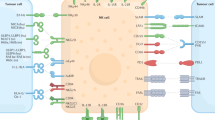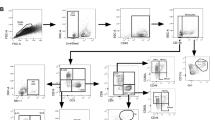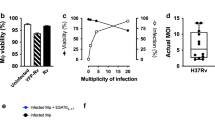Abstract
THE past decade has witnessed numerous attempts to suppress tumour growth by the administration of immune stimulants. Notable successes have been achieved, particularly following the intralesional injection of Bacille Calmette-Guérin (BCG) which has been observed to cause the regression of local tumour nodules in both experimental animals1,2 and man3–5. Although there is some controversy as to the mode of action of BCG, it has become widely accepted that its anti-tumour effects are principally mediated through host macrophages, “activated” by the immunostimulant6–8. Observations we have recently made in studies of the peritoneal exudates of BCG-infected mice suggest an alternative possibility: that tumour destruction is caused by a non-macrophage population of cytotoxic cells which is induced by BCG immunisation.
This is a preview of subscription content, access via your institution
Access options
Subscribe to this journal
Receive 51 print issues and online access
$199.00 per year
only $3.90 per issue
Buy this article
- Purchase on Springer Link
- Instant access to full article PDF
Prices may be subject to local taxes which are calculated during checkout
Similar content being viewed by others
References
Zbar, B., Bernstein, I. D., Bartlett, G. L., Hanna, M. G., Jr, and Rapp, H. J., J. natn. Cancer Inst., 49, 119–130 (1972).
Baldwin, R., and Pimm, M., Br. J. Cancer, 28, 281–287 (1972).
Morton, D. L., Seminars in Oncology, 1, 297–310 (1974).
Laucius, J. F., Bodurtha, A. J., Mastrangelo, M. J., and Creech, R. H., J. Reticuloendothel. Soc., 16, 347–373 (1974).
Bast, R. C., Jr, Zbar, B., Borsos, T., and Rapp, H. J., New Engl. J. Med., 290, 1413–1420, 1458–1469 (1974).
Alexander, P., Natn. Cancer Inst. Mongraph, 39, 127–133 (1973).
Hibbs, J. B., Jr, Science, 180, 868–870 (1973).
Germain, R. N., Williams, R. M., and Benacerraf, B., J. natn. Cancer Inst., 54, 709–720 (1975).
Thorn, R. M., Palmer, J. C., and Manson, L. A., J. Immun. Meth., 4, 301–315 (1974).
Kiessling, R., et al., J. exp. Med., 143, 772–780 (1976).
Herberman, R., Nunn, M., and Lavrin, D., Int. J. Cancer, 16, 216–229 (1975).
Herberman, R., Nunn, M., Holden, H., and Lavrin, P., Int. J. Cancer, 16, 230–239 (1975).
Kiessling, R., Klein, E., Pross, H., and Wigzell, H., Eur. J. Immun., 5, 117–121 (1975).
Lundgren, G., Zukosi, C. F., and Möller, G., Clin. exp. Immun., 3, 817–836 (1968).
Kamat, R., and Henney, C. S., J. Immun., 115, 1592–1598 (1975).
Cerottini, J.-C., Engers, H., MacDonald, H., and Brunner, K. T., J. exp. Med. 140, 703–717 (1974).
Author information
Authors and Affiliations
Rights and permissions
About this article
Cite this article
WOLFE, S., TRACEY, D. & HENNEY, C. Induction of “natural killer” cells by BCG. Nature 262, 584–586 (1976). https://doi.org/10.1038/262584a0
Received:
Accepted:
Issue Date:
DOI: https://doi.org/10.1038/262584a0
This article is cited by
-
Preclinical evaluation of a gene therapy treatment for transitional cell carcinoma
Cancer Gene Therapy (2011)
-
Dynamics of avian inflammatory response toSalmonella-immune lymphokines
Inflammation (1994)
-
Histological changes of the bladder mucosa following the administration of BCG, Adriamycin and RO 10-9359
International Urology and Nephrology (1991)
-
Histopathology of BCG and thiotepa treated bladders
Urological Research (1986)
Comments
By submitting a comment you agree to abide by our Terms and Community Guidelines. If you find something abusive or that does not comply with our terms or guidelines please flag it as inappropriate.



